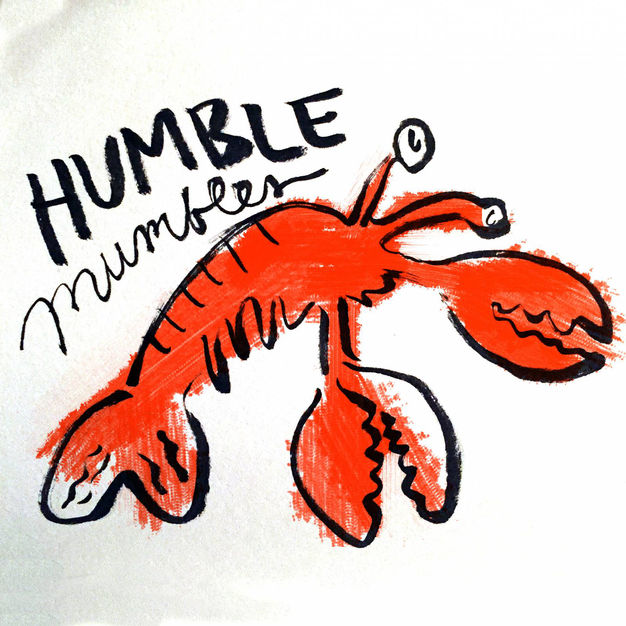
Humble Mumbles
Rebeccabooks LLC
Humble Mumbles is a bumptious feminist podcast of a social-psychological nature featuring searing cultural criticism, psychological investigation and interstitial singing.
- 35. The Spectre of Femininity in Spike Lee’s 25th Hour : a joint episode between Never Forget Radio and Humble Mumbles
25th Hour! It’s a Spike Lee joint. And we (Humble Mumbles & Never Forget Radio) once loved it. It’s the breathless epic/gritty tale/classic caper/New York torque of One Man’s Last Day of Freedom with all its existential reckoning, love, comradeship, suspicion, despair etc etc before he goes to jail (the 25th Hour). It emerged in the early post-9/11 cinema world. And it is directed by Spike Lee and features a fine cast. However, times have changed.
25th Hour, we are proposing, while ostensibly a grand opera of mythic masculinity, burns with fear and desire (to be and to have) of The Feminine. We’re here to talk about it. Via our two podcasts (Humble Mumbles & Never Forget Radio) in concert for maybe the last time. We return in 2018 to the 2015 experience of rewatching this 2002 movie in all its fiery coldness and unspoken but deeply felt desires for warmth…
America in 2002, NFR proposes, was a lot like Edward Norton in 25th Hour: dogged and beat-up and… ready to get back up again and torture and kill in Iraq and Afghanistan. “The film looks perfect and it felt perfect to watch at the time and it felt historical… ” but the overwrought bluster of male-coded ‘fight’ in this post-9/11 movie reveals an obvious ‘underscape’ of feminine ‘flight,’ fantasy and desired-and-feared alternatives to violence.
All lavish and moody blue, I as Humble Mumbles was totally won over by 25th Hour’s New York story of redemption, fathers, sons, macho shit, and the American Dream in the Wake of Catastrophe. But though Traditional Masculinity is the menacing, despairing center of this movie, failure to compete and win at this unwinnable game–Being a Man–(and thus avoid humiliation, rape and death) compelled me. “Femininity, or rather the idea of femaleness permeates this film, but no woman can be feminine the way it’s patriarchically defined. Nor can any man. For even though men and women are socialized to be all-or-nothing opposites, we still can’t help but be multifaced humans”
[audio http://archive.org/download/25th_hour_final/25th_hour_final.mp3]27 November 2018, 10:09 am - 34. Penina on Souli : a joint Jewish-American / Palestinian book project
“When I first met him, it was at my mom’s house in Minnesota…
My mom is a rabbi.. He was giving a talk about his story and she loved him–as many middle-aged Jewish women do–he’s an incredibly charming person; that’s one of the pieces of his story… ”Penina Eilberg-Schwartz is a Jewish-American writer/poet and electric guitar player with San Francisco-based band Little Teeth writing a nontraditional biography with and about her friend and former romantic partner Sulaiman Khatib, the Palestinian co-founder of Combatants for Peace.
“We’ve known each other for 10 years and… He’s been a really powerful and strange force in my life and the dynamics … between us in the writing of the book, I think, have a lot to say and point to and question about other relationships in the context of The Conflict… I sort of see the book as joint struggle. I’m very aware of my position as a white Jewish-American writing a Palestinian story. I’m also aware that I’m a much younger woman and he’s an older man and there are certain dynamics that come along with that–and we used to have a romantic relationship–so that also frames our friendship now and our way of working and that’s a pretty… controversial thing, I think, in this context. There’s a lot of things that scare me about that… but I think also a lot of potential for doing something different than is usually done in literature about Israel/Palestine.”
[audio http://archive.org/download/penina_on_souli/penina_on_souli.mp3]27 November 2018, 10:05 am - 33. Walking with Maya through an Israeli settlement in the West Bank
In episode 3 of the ‘Foreigners in Palestine’ series, our rubbernecking wide-eyed war reporter travels to Hebron, where she meets the luminously seen-it-all Maya, a 19-year-old Danish woman working with the Palestinian group Youth Against Settlements.
“Can I just ask you a question: does it seem at all scary knowing that someone got killed there before–or is it not even because people get killed everywhere?” – Rebecca, agape American
“Well, we went up to Tel Rumeida once and nearly got arrested again because the soldier knew me and we weren’t supposed to be there, and Jawad showed us a bullet hole from… the Palestinian who was shot on the ground recently, so…” – Maya, capable Dane
In this episode, Maya talks about her experiences in Hebron, interacting with soldiers at checkpoints, taking part in nonviolent demonstrations that incur violent reprisals, helping to organize the Open Shuhadah Street Campaign, witnessing multiple arrests of Youth Against Settlements (YAS) founder Issa Amro as well as that of 16-year-old Ahmad Azza, the disrupted commemoration of teenager Hadeel Hashlamoun after she was killed at Checkpoint 56….
We also hear about her experiences with notorious Hebron settlers, one known to yell “go to Auschwitz!” to Palestinians and foreigners, drive her car into crowds of protesting Palestinians and, on one occasion, chase Maya down the street; another drives around in an ambulance harassing people and preventing injured Palestinians from getting medical treatment…
A few of the places Maya and Rebecca walk through in this episode include: three Israeli settlements, Checkpoint 56, Hebron’s Old City and Shuhadah Street, a major thoroughfare now off limits to Palestinians (“Palestinians live here but they can’t use their front door, because they were welded shut by Israelis in ~2006… there’s a woman living up in one of those houses; her front door was welded shut while the family was still inside so they had to make a new door the same day in the back of the house”).
[audio http://archive.org/download/maya_settlement_walk/Maya_settlement_walk–REAL.mp3]2 July 2018, 6:15 pm - 32. Poppy and Lola in Nablus and Ramallah
It’s a classic story. A sultry summer’s night: Two suave British students of Arabic and one flustered American activist talk about being Western women in Palestine.
Rebecca: “So what’s it like traveling in the West Bank ?”
Lola: “Sometimes it’s just like commuting… “
Poppy: “It’s completely different for internationals, there’s not really the same restriction on movement. But even for the four months I couldn’t get into Israel, didn’t really bother me; it was like yea, I’ll go another day”
Me: “And can you say why you couldn’t get into Israel?”
Poppy: “Yea, because they thought I was an activist… but, oh well”
Me: “So you haven’t gone into Jerusalem yet..”
Poppy: “I did once.. but I had to go around a village checkpoint”
Me: “So you went into Israel without a visa?”
Poppy: “Yes”
Me: “Cool”Episode 2 of our ‘Foreigners in Palestine’ series features Lola and Poppy—who were studying at university in Nablus before moving to Ramallah—and Rebecca, a frenzied American rambler then staying in Beit Sahour.
“I don’t consider myself an activist, not because I’m inactive, but because I feel the definitions of being an activist are too narrow. I came here with a heightened awareness of ‘oh i don’t want to be THAT person–writing a ‘travelogue’ or i suppose the modern equivalent would be a blog–but theorizing it to such a certain extent that I never actually looked at it.” – Lola
“In a way I don’t feel like I’m entitled to give an opinion (on The Conflict). I’ve got to say, I just don’t feel a lot of guilt for being an international in Palestine. Personally I don’t feel too connected to the colonial background. I have no historical connection to Palestine so why should I have an opinion on it?” – Poppy
“We do have a historical connection to Palestine. If you think about it linguistically, the second language here is English…” – Lola
“I always feel really guilty… but I also profit off my own guilt” – Rebecca
In a talk that comprehensively covers The West’s legacy of interaction with The East, the three discuss ‘analyzing cultures on their own terms’, ‘not presuming a line of zero cultural longitude,’ efficacy, appropriateness, and neutrality…
“What is like to be.. a Westerner in Ramallah, and what is it like to be here… studying in Palestine, as opposed to coming to Palestine for activism? Then again, I came here for activism and now I’m just hanging out” – Rebecca
“I don’t think there’s any value in me personally, as a British woman, lamenting the differences between Nablus and Ramallah–those are the two places I’ve lived … I don’t think there’s any value in me lamenting a supposed loss of culture because that kind of narrative, in my eyes, assumes some kind of static culture that was always there and pure and idealized and historicized but that doesn’t necessarily exist because this has always been a contested and international place… Nablus is changing, Jericho is changing… Ramallah is also changing and maybe Ramallah is changing on a trajectory that is more easily mapped towards westernization / easternization so it’s easier for us to quantify that with our own experience but I don’t feel any need to lament it or feel guilty about living here.” – Lola
“I didn’t expect to see much firsthand occupation and everything… It’s definitely lot more visual than I expected it to be” – Poppy.
**Full disclosure: I, Rebecca, your freaked-out jewish-american host, the kind of host who roams through the messianic-nationalistic-apocalyptic Israeli settlements in Hebron at 2am strung-out and crying, found Poppy and Lola’s distance and intentional stepping back from the conflict really fascinating and challenging and complicating; I hope you also find this a rich discussion!
“I think that’s a cultural legacy that we have: we’re so aware that British people have come here and stated their opinions very loudly–it’s like: have you not had enough of us, people with our accents?” – Lola
[audio http://archive.org/download/poppy_and_lola/poppy_and_lola.mp3]29 June 2018, 5:06 pm - 31. Two Americans and a Frenchwoman in Palestine
Welcome to the dubious ‘Foreigners in Palestine’ series!
In this episode, we speak with three young people from The West:
Alice, a French artist in Bethlehem,
Lily, an American archaeologist in Jerusalem &
Rebecca, an American layabout in Beit SahourWho ARE these 20-30-year-old white women in Palestine?
“Hamdulillah, Israel!”
In Episode 1 of our ‘Foreigners in Palestine’ series, our sassily uninformed reporter Rebecca speaks with her fellow Westerners in order to uncover the mystery aka ‘solve the conflict’*
Alice and Lily talk about laïcité, experiences in hamams in Nablus and synagogues in Chattanooga before, in Rebecca’s section, the episode takes a hallucinogenic turn into horror and dread
All these interviews were recorded in the vicinity of Bethlehem at Aida Refugee Camp (Alice), the parking lot next to Al Qasr kanafe (Lily) and Rebecca’s apartment by Il Forno restaurant in Beit Sahour
[audio http://archive.org/download/foreigners_in_palest/foreigners_in_palestine.mp3]27 June 2018, 4:59 pm - 30. Eitan Bronstein in Ramat Aviv
“You know, me being Israeli, my very, very identity as Israeli, one of the most important components of being Israeli is being an occupier here”
In this episode we speak with Eitan Bronstein Aparicio, co-creator of Decolonizer (www.de-colonizer.org) and former director of Zochrot (zochrot.org) on the importance of alternative education even when immediate change is not on the horizon, creative in-the-street actions, ideas of Israeli identity, education, Pierre Nora’s distinction between history and memory specifically as concerns the Palestinian Nakba and the Golan Heights/Occupied Syria and travel in the Sinai!
[audio http://archive.org/download/eitan/eitan.mp3]16 May 2018, 6:03 pm - 29. Bad Activist, Part II : Philadelphia Fringe Festival 2017
Welcome to the (second part of the) second version of Bad Activist: Sex Politics, Palestine and YOU… or maybe version 2.5. A play, by Humble Mumbles
Narrator: Who is this girl? [enter Bad Activist] I met her in Palestine but she’s not Palestinian. She’s an American. An American Jew. … the star of this play and also my heart.
Bad Activist: The energy here is so topsy-turvy, so extreme of high and lows! I keep trying to flirt with people!….. but they’re too busy narrowly avoiding death. I get that [pause] It’s more inappropriate to be attracted to someone’s nationality than their body, right? More fetishistic?
Narrator [to audience]: I assumed she was joking so I didn’t answer her, not then, not now.
What was born at the Night Kitchen bit.ly/2hPVUd2
and transmogrified into a local art bit.ly/2A5RvgM
has now become… an Experimental Theatrical in the Philadelphia Fringe Fest of 2017 !What it looked like: bit.ly/2mZKskL
What the people said: bit.ly/2vU8kq0 bit.ly/2hQgrOC bit.ly/2A5aXdWSee a newer, less brechtian Third Version of this play touring the East Coast of the United States in Spring 2018.
What you can expect in Bad Activist, Version 3.5 —>
[audio http://archive.org/download/bad_activist_at_art_-humble_mumbles-29/Bad_Activist_at_Art_Church_part_II.mp3]
more Shakespearean ghost sequences, confrontation, making out. Plus: brand new scenes! a whole new character!27 November 2017, 8:50 pm - 28. Bad Activist, Part I : Philadelphia Fringe Festival 2017
Welcome to the (first part of the) second version of Bad Activist: Sex Politics, Palestine and YOU… or maybe version 2.5. A play, by Humble Mumbles
Narrator: Who is this girl? [enter Bad Activist] I met her in Palestine but she’s not Palestinian. She’s an American. An American Jew. … the star of this play and also my heart.
Bad Activist: The energy here is so topsy-turvy, so extreme of high and lows! I keep trying to flirt with people!….. but they’re too busy narrowly avoiding death. I get that [pause] It’s more inappropriate to be attracted to someone’s nationality than their body, right? More fetishistic?
Narrator [to audience]: I assumed she was joking so I didn’t answer her, not then, not now.
What was born at the Night Kitchen bit.ly/2hPVUd2
and transmogrified into a local art bit.ly/2A5RvgM
has now become… an Experimental Theatrical in the Philadelphia Fringe Fest of 2017 !What it looked like: bit.ly/2mZKskL
What the people said: bit.ly/2vU8kq0 bit.ly/2hQgrOC bit.ly/2A5aXdWSee a newer, less brechtian Third Version of this play touring the East Coast of the United States in Spring 2018.
What you can expect in Bad Activist, Version 3.5 —>
[audio http://archive.org/download/bad_activist_at_art_-humble_mumbles/Bad_Activist_at_Art_Church_part_I.mp3]
more Shakespearean ghost sequences, confrontation, making out. Plus: brand new scenes! a whole new character!27 November 2017, 8:38 pm - 27. Wisam Salsaa of Banksy’s Walled-Off Hotel
In this episode our Humble Mumbles representative speaks with Wisam Salsaa, owner and manager of The Walled-Off Hotel (a play on Waldorf Hotel), the creation of renowned political art cipher Banksy.
Is this hotel effective political satire? Disrespectful Western meddling? A comfortable abode for the traveler to Bethlehem?
Salsaa fields all these criticisms and more (is the hotel antizionist enough? is it responsive to the local community; what IS Palestinian community), speaks about the hotel’s clientele (Westerners, Palestinians and… Israelis), the hotel’s future, and the responsibility of art. Enjoy.
Music provided by a few recorded seconds in the hotel’s museum and Philadelphian musicmakers Blown Away
Thanks to Wisam Salsaa and The Walled Off Hotel, Never Forget Radio,The Pollination Project & the Puffin Foundation
The Walled Off Hotel
walledoffhotel.comA plethora of opinions:
http://www.aljazeera.com/indepth/opinion/2017/03/walled-hotel-struggle-decolonisation-170312143224959.html
http://www.maannews.com/Content.aspx?id=775854
http://www.buzzfeed.com/gabrielsanchez/21-politically-subversive-views-from-inside-bankys-new-hotel?utm_term=.dgDkP3qZb#.wnVLAbXYq
http://www.merip.org/mero/mero032217
972mag.com/banksys-new-project-tells-the-story-of-palestine/126395/
http://www.youtube.com/watch?v=2KGgDZcHJmwFor our non-Arabic speakers, you may notice that Salsaa often peppers his speech with the word ‘yianni’ which is essentially slang for ‘you know’ or ‘so to speak’ so now you know, yianni.
[audio http://archive.org/download/wisam_at_banksy/Wisam_at_Banksy.mp3]21 November 2017, 6:12 pm - 26. “The Occupation is a Manifestation of the Problem” : An Interview with Jonathan Cook, Part II
Part II
(Part I here : bit.ly/2ptW4gs)Are you looking for a gloriously compelling, coherent and comprehensive introduction to 20th century Palestine/Israel in the context of 19th century Europe and 21st century America? This is the clear and impassioned two-part interview episode for you
“History didn’t stop 2000 years ago and start again in 1948”
Last summer, our Humble Mumbles representative spoke with British journalist Jonathan Cook at Liwan cafe in Nazareth. We discussed: doublethink, dignity, borders, mythology, politics of archeology and forgotten history!
Jonathan speaks informally—with clarity, wit and grace!—about what led him to become an Israeli citizen, his political awakening during the second intifada, as well as his analysis of Israeli conceptions of Palestinians—whether as Israeli citizens or residents of the Occupied Territories.
“In the era of modern human rights, one could argue that Israel has been unlucky—I mean, it was created in 1948, same year as the Universal Declaration of Human Rights was issued; it’s also the time that the Nuremberg Trials had defined what war crimes were and crimes against humanity, so Israel emerges doing all these very bad and ugly things just when the world has settled on the idea of what these bad and ugly things are, and Israel is doing them. One has therefore to turn a blind eye to this, which creates a huge sense of hypocrisy. But when we look at other countries, we see very similar things, and more successfully in many ways, like United States or Australia or Canada where we didn’t see mass ethnic cleansing, what we saw was genocide. And it was possible to do genocide then because we didn’t have 24 hour rolling news, we didn’t have the Universal Declaration of Human Rights; people didn’t really care, they thought ‘these people are so primitive and barbaric that you could do what you like with them.’ Now we don’t live in that world anymore although many people in Israel seem to think it would be a good idea if we did, but we don’t. We have to accept that’s not the way the world works anymore. And so Israel is trapped in this effort to try to replicate what other settler-colonial societies did without being abel to commit the kinds of genocides that were committed then and this is why we see these decades of very ugly struggle against the Palestinians. They have to control them, oppress them, deny them all their rights while at the same time trying to seem like they’re a democracy because that’s what we expect of states now.”
Music provided by diy punk art kids Old Table, performing their smash hit “Israeli Prime Minister,” a minister Jonathan Cook knows well in terms of living under him
[audio http://archive.org/download/cook2eq/cook2eq.mp3]14 May 2017, 8:25 pm - More Episodes? Get the App
Your feedback is valuable to us. Should you encounter any bugs, glitches, lack of functionality or other problems, please email us on [email protected] or join Moon.FM Telegram Group where you can talk directly to the dev team who are happy to answer any queries.
 The NPR Politics Podcast
The NPR Politics Podcast
 Revisionist History
Revisionist History
 Pod Save America
Pod Save America
 The Daily
The Daily
 S-Town
S-Town
 This American Life
This American Life